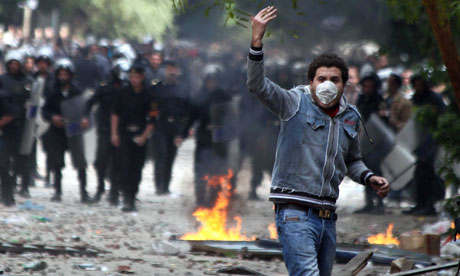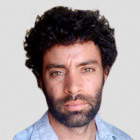
@HebeishyMohamed El Hebeishy

An Egyptian protester in Tahrir Square during clashes with security forces. Photograph: News Pictures/Rex Features
Mohamed El Hebeishy: 'Are the riot police fighting a proxy battle?'

Why are the riot police are back in action? Since Egypt's notorious day of rage on 28 January, the past three days have witnessed the most violent clashes between demonstrators and the security forces.
Unlike previous clashes, where demonstrations and sit-ins were cracked down upon by the military police, this time those firing teargas canisters are the riot police. Not to mention that the demonstrations are in protest against the military junta in the first place.
Are the riot police fighting a proxy battle? On 28 January, clashes between angry demonstrators and riot police ended up with the army establishing its tanks and armoured vehicles to maintain order – a move cheered by the masses that saw a saviour in the military uniforms. Egyptians do hold a high degree of respect and appreciation for the military establishment.
Ten months on, the day of rage is being resurrected, but will history repeat itself? Will the riot police at a certain point withdraw and the army tanks take to the streets once again? Is it another step towards affirming the notion that the military establishment is the sole guardian of the country, not only externally but now internally as well?
Amira Nowaira: 'An increased dose of violence will increase anger'

There is a strong sense of deja vu in what is happening in Egypt today. In 1954 Egypt's young officers created mayhem to justify their clampdown on opposition and renege on their democratic promises. The horrific events of the last couple of days in Tahrir and several other places in the country suggest that Egypt's ageing generals are reading the same manual and following the same strategy.
It is a strategy that the Supreme Council of the Armed Forces (SCAF) tried a few times in recent months, most noticeably in the Maspero incident on 9 October, when a peaceful Coptic protest was met with incredible brutality and many were run over by military trucks. The message sent by Maspero was not directed at Copts alone. It was a message sent to all Egyptians, telling them that SCAF would not tolerate dissent. Nor would it balk at using as much deadly violence as is required.
It is becoming increasingly and sadly evident to many Egyptians that SCAFstan is just an extension of Mubarakstan. But the question is: can SCAF really succeed where Mubarak had failed? This seems hugely unlikely, for an increased dose of violence will only increase anger and solve no problems. Unfortunately, this is a lesson that SCAF probably hasn't learned.
Matthew Cassel: 'Brutality is no longer a deterrent'

"The people want the downfall of the regime" became the iconic slogan when millions took to the streets earlier this year calling for the removal of President Hosni Mubarak. Today, almost 10 months after Mubarak stepped down, protesters are chanting the same thing but this time their target is the SCAF that has been running the country since February.
Much of the media is portraying what's happening as "clashes" in Cairo and elsewhere in Egypt with the implication that it's between two equal sides. Such a description is grossly misleading.
There is an ongoing revolution happening in Egypt. From the first day, the symbol of the revolution has been the sit-in protests at Cairo's Tahrir (Liberation) Square. In recent days, when the masses returned to Tahrir to ensure the revolution's forward progress, they were attacked. Instead of giving up their protest and letting the authorities trample all over their rights, they remained steadfast and fought back.
The revolutions in the Arab world were never going to happen overnight; it's going to take years to transform autocracies into democracies. Until that happens, street demonstrations in countries such as Egypt, Syria, Yemen and Bahrain (where massive protests are expected this week) will continue until the state and its security forces realise that their brutality is no longer a deterrent.
Sara Khorshid: 'Both camps have failed Egyptians'

Tahrir is back – with its heroes persevering for the sake of freedom, giving us a break from those who occupied the media headlines in the past months. The media put a spotlight on the icons of two poles in a reductionist dichotomy: the Muslim Brotherhood and the Salafi Da'wa and their parties, often referred to as "the Islamists", although Islamist thought and activism is broader than them; the other pole is labelled in Egyptian media as the liberals, secularists and civil bloc, with the definitions of the three terms vague and inaccurate.
Since Hosni Mubarak stepped down, the Brotherhood and the Salafis have been obsessed with the elections – and in their pursuit of elections, the real, wider goals of the revolution don't seem to take priority. As to the secularists, they apparently fear nothing more than elections, so they find it OK to undemocratically impose their vision on the people; liberal icons like Mamdouh Hamza and Naguib Sawiris supported imposing thesupra-constitutional principles document with no popular referendum or parliamentary vote. Both camps have failed Egyptians, and are constantly fuelling a war against each other. After they – and the ruling SCAF – distracted us, revolutionaries in Tahrir and across Egypt are putting us back on track: toppling the regime and cleansing the political arena off the regime's corrupt remnants, which essentially entails ending SCAF's rule.
